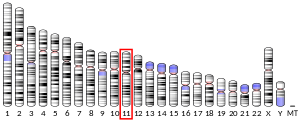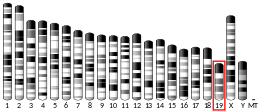Pre-mRNA-processing factor 19 is a protein that in humans is encoded by the PRPF19 gene.[5][6]
In S. cerevisiae, Pso4 has pleiotropic functions in DNA recombination and in error-prone nonhomologous end-joining DNA repair.[supplied by OMIM][6]
Interactions
editReferences
edit- ^ a b c GRCh38: Ensembl release 89: ENSG00000110107 – Ensembl, May 2017
- ^ a b c GRCm38: Ensembl release 89: ENSMUSG00000024735 – Ensembl, May 2017
- ^ "Human PubMed Reference:". National Center for Biotechnology Information, U.S. National Library of Medicine.
- ^ "Mouse PubMed Reference:". National Center for Biotechnology Information, U.S. National Library of Medicine.
- ^ Mahajan KN, Mitchell BS (September 2003). "Role of human Pso4 in mammalian DNA repair and association with terminal deoxynucleotidyl transferase". Proc Natl Acad Sci U S A. 100 (19): 10746–51. Bibcode:2003PNAS..10010746M. doi:10.1073/pnas.1631060100. PMC 196874. PMID 12960389.
- ^ a b "Entrez Gene: PRPF19 PRP19/PSO4 pre-mRNA processing factor 19 homolog (S. cerevisiae)".
- ^ Ajuh P, Kuster B, Panov K, Zomerdijk J C, Mann M, Lamond A I (December 2000). "Functional analysis of the human CDC5L complex and identification of its components by mass spectrometry". EMBO J. 19 (23): 6569–81. doi:10.1093/emboj/19.23.6569. ISSN 0261-4189. PMC 305846. PMID 11101529.
Further reading
edit- Gerner C, Holzmann K, Meissner M, et al. (1999). "Reassembling proteins and chaperones in human nuclear matrix protein fractions". J. Cell. Biochem. 74 (2): 145–51. doi:10.1002/(SICI)1097-4644(19990801)74:2<145::AID-JCB1>3.0.CO;2-#. PMID 10404385. S2CID 196598497.
- Gotzmann J, Gerner C, Meissner M, et al. (2000). "hNMP 200: a novel human common nuclear matrix protein combining structural and regulatory functions". Exp. Cell Res. 261 (1): 166–79. doi:10.1006/excr.2000.5025. PMID 11082287.
- Andersen JS, Lyon CE, Fox AH, et al. (2002). "Directed proteomic analysis of the human nucleolus". Curr. Biol. 12 (1): 1–11. Bibcode:2002CBio...12....1A. doi:10.1016/S0960-9822(01)00650-9. PMID 11790298. S2CID 14132033.
- Jurica MS, Licklider LJ, Gygi SR, et al. (2002). "Purification and characterization of native spliceosomes suitable for three-dimensional structural analysis". RNA. 8 (4): 426–39. doi:10.1017/S1355838202021088. PMC 1370266. PMID 11991638.
- Scherl A, Couté Y, Déon C, et al. (2003). "Functional proteomic analysis of human nucleolus". Mol. Biol. Cell. 13 (11): 4100–9. doi:10.1091/mbc.E02-05-0271. PMC 133617. PMID 12429849.
- Strausberg RL, Feingold EA, Grouse LH, et al. (2003). "Generation and initial analysis of more than 15,000 full-length human and mouse cDNA sequences". Proc. Natl. Acad. Sci. U.S.A. 99 (26): 16899–903. Bibcode:2002PNAS...9916899M. doi:10.1073/pnas.242603899. PMC 139241. PMID 12477932.
- Makarova OV, Makarov EM, Urlaub H, et al. (2004). "A subset of human 35S U5 proteins, including Prp19, function prior to catalytic step 1 of splicing". EMBO J. 23 (12): 2381–91. doi:10.1038/sj.emboj.7600241. PMC 423283. PMID 15175653.
- Jin J, Smith FD, Stark C, et al. (2004). "Proteomic, functional, and domain-based analysis of in vivo 14-3-3 binding proteins involved in cytoskeletal regulation and cellular organization". Curr. Biol. 14 (16): 1436–50. Bibcode:2004CBio...14.1436J. doi:10.1016/j.cub.2004.07.051. PMID 15324660. S2CID 2371325.
- Gerhard DS, Wagner L, Feingold EA, et al. (2004). "The status, quality, and expansion of the NIH full-length cDNA project: the Mammalian Gene Collection (MGC)". Genome Res. 14 (10B): 2121–7. doi:10.1101/gr.2596504. PMC 528928. PMID 15489334.
- Andersen JS, Lam YW, Leung AK, et al. (2005). "Nucleolar proteome dynamics". Nature. 433 (7021): 77–83. Bibcode:2005Natur.433...77A. doi:10.1038/nature03207. PMID 15635413. S2CID 4344740.
- Löscher M, Fortschegger K, Ritter G, et al. (2005). "Interaction of U-box E3 ligase SNEV with PSMB4, the beta7 subunit of the 20 S proteasome". Biochem. J. 388 (Pt 2): 593–603. doi:10.1042/BJ20041517. PMC 1138967. PMID 15660529.
- Rual JF, Venkatesan K, Hao T, et al. (2005). "Towards a proteome-scale map of the human protein-protein interaction network". Nature. 437 (7062): 1173–8. Bibcode:2005Natur.437.1173R. doi:10.1038/nature04209. PMID 16189514. S2CID 4427026.
- Zhang N, Kaur R, Lu X, et al. (2006). "The Pso4 mRNA splicing and DNA repair complex interacts with WRN for processing of DNA interstrand cross-links". J. Biol. Chem. 280 (49): 40559–67. doi:10.1074/jbc.M508453200. PMID 16223718.
- Grillari J, Ajuh P, Stadler G, et al. (2005). "SNEV is an evolutionarily conserved splicing factor whose oligomerization is necessary for spliceosome assembly". Nucleic Acids Res. 33 (21): 6868–83. doi:10.1093/nar/gki986. PMC 1310963. PMID 16332694.
- Voglauer R, Chang MW, Dampier B, et al. (2006). "SNEV overexpression extends the life span of human endothelial cells". Exp. Cell Res. 312 (6): 746–59. doi:10.1016/j.yexcr.2005.11.025. PMID 16388800.
- Lu X, Legerski RJ (2007). "The Prp19/Pso4 core complex undergoes ubiquitylation and structural alterations in response to DNA damage". Biochem. Biophys. Res. Commun. 354 (4): 968–74. doi:10.1016/j.bbrc.2007.01.097. PMC 1810354. PMID 17276391.
- Fortschegger K, Wagner B, Voglauer R, et al. (2007). "Early embryonic lethality of mice lacking the essential protein SNEV". Mol. Cell. Biol. 27 (8): 3123–30. doi:10.1128/MCB.01188-06. PMC 1899945. PMID 17283042.
- Ewing RM, Chu P, Elisma F, et al. (2007). "Large-scale mapping of human protein-protein interactions by mass spectrometry". Mol. Syst. Biol. 3 (1): 89. doi:10.1038/msb4100134. PMC 1847948. PMID 17353931.




